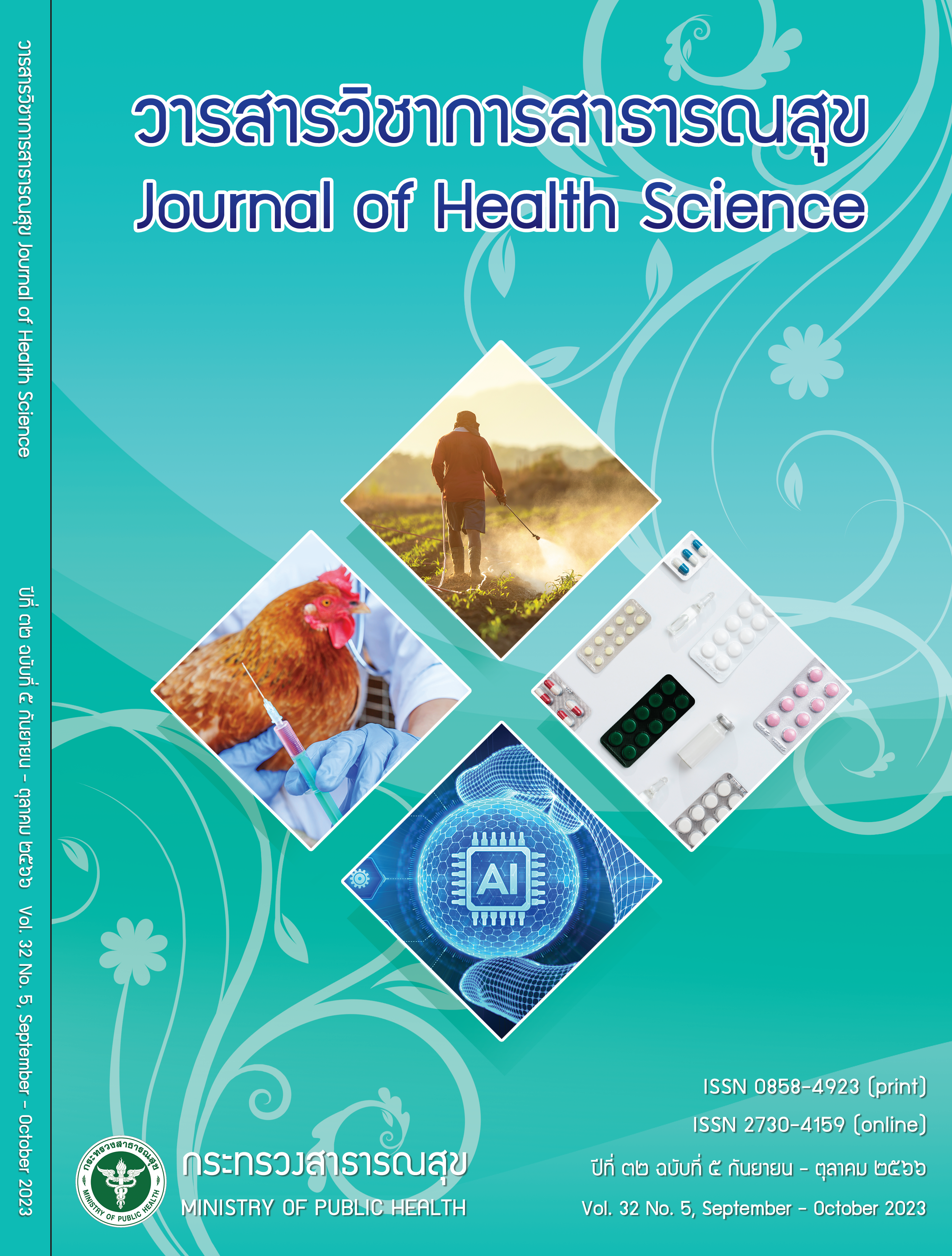Rational Use of Antibiotic Prophylaxis Prior to Rigid Cystoscopy: a Randomized Controlled Trial
Keywords:
cystoscopy, antibiotics, prophylaxis, UTI, urinary tract infection, RCT, randomized controlled trial, rational drug useAbstract
The objective of this study was to assess the need for using antibiotic in patients undergoing rigid cystoscopy. It was conducted as a randomized controlled trial by comparing the infection rate of patients receiving antibiotic prophylaxis with those who received a placebo 1 hour prior to rigid cystoscopy during July 2015 and March 2016. The samples were patients aged above 18 years who were indicated for cystoscopy and were randomly enrolled into 2 groups: (1) the experimental group (33 patients) who received ofloxacin 200 mg, and (2) the control group (33 patients) who received placebo. The urinary tract infection was determined by the occurrence of bacteriuria and febrile urinary tract infection (UTI). Independent samples t-tests and Fisher’s exact tests were used, and the significant p-value was set at 0.05 level. It was found that there was no difference in demographic data between the two groups. In addition, there was no statistically significant difference on the occurrence of bacteriuria and febrile UTI between the two groups. None of the patients had adverse effects due to the method used in our study. Thus, it is highly likely that antibiotic prophylaxis has no role in reducing either infection or asymptomatic bacteriuria relating to the cystoscopy. Therefore, antibiotic prophylaxis is not recommended. The results of this study can be used as a guideline for clinicians to use antibiotics more effectively; which is in line with the global movement on the rational drug use. However, larger trials should be performed to verify the results.
Downloads
References
Almallah YZ, Rennie CD, Stone J, Lancashire MJR. Urinary tract infection and patient satisfaction after flexible cystoscopy and urodynamic evaluation. Urology 2000;56(1):37-9.
Escandón-Vargas K, García-Perdomo HA, Echeverría F, Osorio JD. Risk of urinary tract infection in patients with positive urine culture and antibiotic therapy undergoing cystoscopy in a third-level hospital. Infezioni in Medicina 2015;23(4):336-42.
Clark KR, Higgs MJ. Urinary infection following out-patient flexible cystoscopy. British Journal of Urology 1990;66(5):503-5.
Ordon M, Kodama R, Honey RJ. Letter to the Editor re best practice policy statement on urologic surgery antimicrobial prophylaxis (Wolf Jr JS, Bennett CJ, Dmochowski RR, Hollenbeck BK, Pearle MS, Schaeffer AJ). J Urol 2009:182(2):799-801.
Nicolle LE, Bradley S, Colgan R, Rice JC, Schaeffer A, Hooton TM. Infectious diseases society of America guidelines for the diagnosis and treatment of asymptomatic bacteriuria in adults. Clinical Infectious Diseases 2005;40(5):643-54.
Jackson AA, Ackerman C, Alesna N, Hicks K, Tanner JP, Chang ES, et al. A retrospective cohort study to identify the risk factors for urinary tract infection after office procedures. Female Pelvic Medicine and Reconstructive Surgery 2022;28(3):165-72.
Zeng S, Zhang Z, Bai Y, Sun Y, Xu C. Antimicrobial agents for preventing urinary tract infections in adults undergoing cystoscopy. Cochrane Database of Systematic Reviews 2019;2:CD012305.
Johnson MI, Merrilees D, Robson WA, Lennon T, Masters J, Orr KE, et al. Oral ciprofloxacin or trimethoprim reduces bacteriuria after flexible cystoscopy. BJU International 2007;100(4):826-9.
Herr HW. Should antibiotics be given prior to outpatient cystoscopy? A plea to urologists to practice antibiotic stewardship. European Urology 2014;65(4):839-42.
Clennon EK, Acevedo AM, Sajadi KP. Safety and effectiveness of zero antimicrobial prophylaxis protocol for outpatient cystourethroscopy. BJU International 2019;123(5):E29-E33.
Egrot C, Dinh A, Amarenco G, Bernard L, Birgand G, Bruyère F, et al. Antibiotic prophylaxis in urodynamics: Clinical practice guidelines using a formal consensus method. Progres en Urologie 2018;28(17):943-52.
Ross J, Hickling D. Current bladder dysfunction reports: antibiotic overuse in office-based lower urinary tract procedures. Current Bladder Dysfunction Reports 2022;17(4):279-86.
Rané A, Cahill D, Saleemi A, Montgomery B, Palfrey E. The issue of prophylactic antibiotics prior to flexible cystoscopy. European Urology 2001;39(2):212-4.
Alsaywid B, Smith G. Antibiotic prophylaxis for transurethral urological surgeries: systematic review. Urology Annals 2013;5(2):61-74.
Chavarriaga J, Villanueva J, Varela D, Erazo S, Usubillaga MC, Erazo JC, et al. Do we need a urine culture before cystoscopy? Time to shift away from routine testing. Urology. 2023;172:13-7.
Trail M, Cullen J, Fulton E, Clayton F, McGregor E, McWilliam F, et al. Evaluating the safety of performing flexible cystoscopy when urinalysis suggests presence of “infection”: results of a prospective clinical study in 2350 patients. European Urology Open Science 2021;31:28- 36.
Hares MM. Re: Is antibiotic administration indicated after outpatient cystoscopy. Journal of Urology 1989; 142(3):833.
Karmouni T, Bensalah K, Alva A, Patard JJ, Lobel B, Guillé F. Role of antibioprophylaxis in ambulatory crystoscopy. Progres en Urologie 2001;11(6):1239-41.
García-Perdomo HA, Jiménez-Mejías E, López-Ramos H. Efficacy of antibiotic prophylaxis in cystoscopy to prevent urinary tract infection: a systematic review and meta-analysis. International Braz J Urol 2015;41(3) :412-22.
Bradshaw A, Pe M, Bechis S, Dipina T, Zupkas P, Abbott J, et al. Antibiotics are not necessary during routine cystoscopic stent removal: a randomized controlled trial at UC San Diego. Urology Annals 2020;12(4):373-8.
Benseler A, McDermott CD. Use of prophylactic antibiotics to prevent urinary tract infection after urodynamic testing and cystoscopy in women: a practice pattern study. Gynecologic and Obstetric Investigation 2022; 87(2):116-23.
Benseler A, Anglim B, Zhao ZY, Walsh C, McDermott CD. Antibiotic prophylaxis for urodynamic testing in women: a systematic review. International Urogynecology Journal 2021;32(1):27-38.
Wu XY, Cheng Y, Xu SF, Ling Q, Yuan XY, Du GH. Prophylactic antibiotics for urinary tract infections after urodynamic studies: a meta-analysis. BioMed Research International 2021;2021:6661588.
Wilson L, Ryan J, Thelning C, Masters J, Tuckey J. Is antibiotic prophylaxis required for flexible cystoscopy? A truncated randomized double-blind controlled trial. Journal of Endourology 2005;19(8):1006-8.
García-Perdomo HA, López H, Carbonell J, Castillo D, Cataño JG, Serón P. Efficacy of antibiotic prophylaxis inpatients undergoing cystoscopy: a randomized clinical trial. World Journal of Urology 2013;31(6):1433-9.
Casteleijn NF, Vriesema JL, Stomps SP, van Balen OLWB, Cornel EB. The effect of office based flexible and rigid cystoscopy on pain experience in female patients. Investigative and Clinical Urology 2017;58(1):48-53.
Downloads
Published
How to Cite
Issue
Section
License

This work is licensed under a Creative Commons Attribution-NonCommercial-NoDerivatives 4.0 International License.







